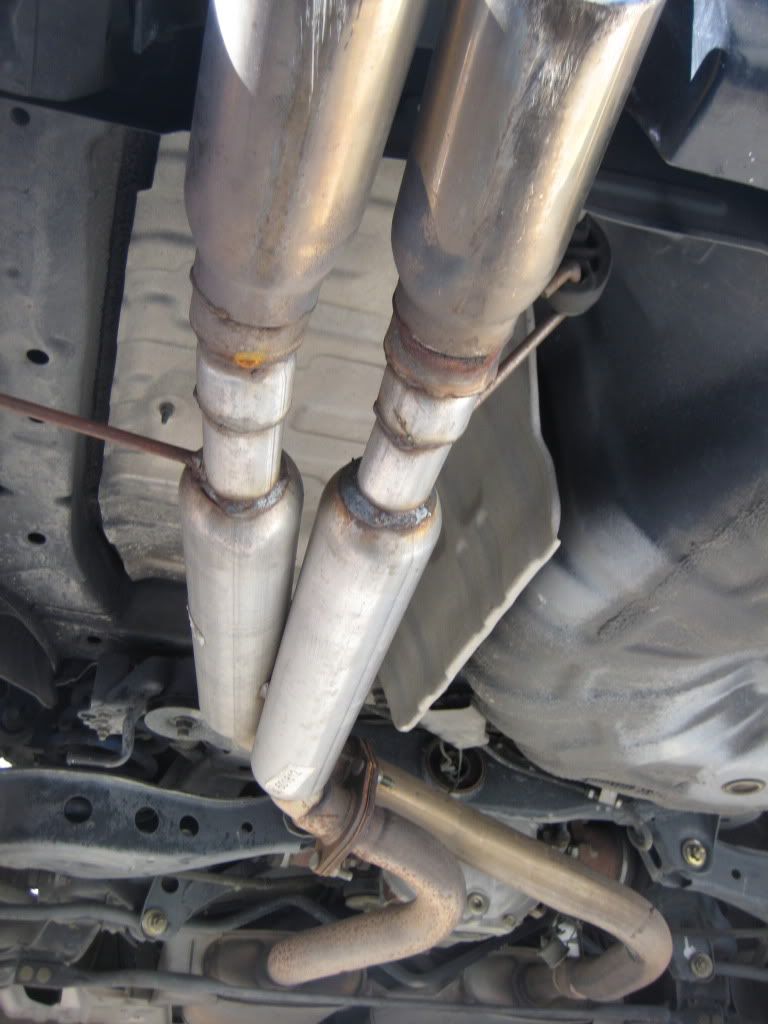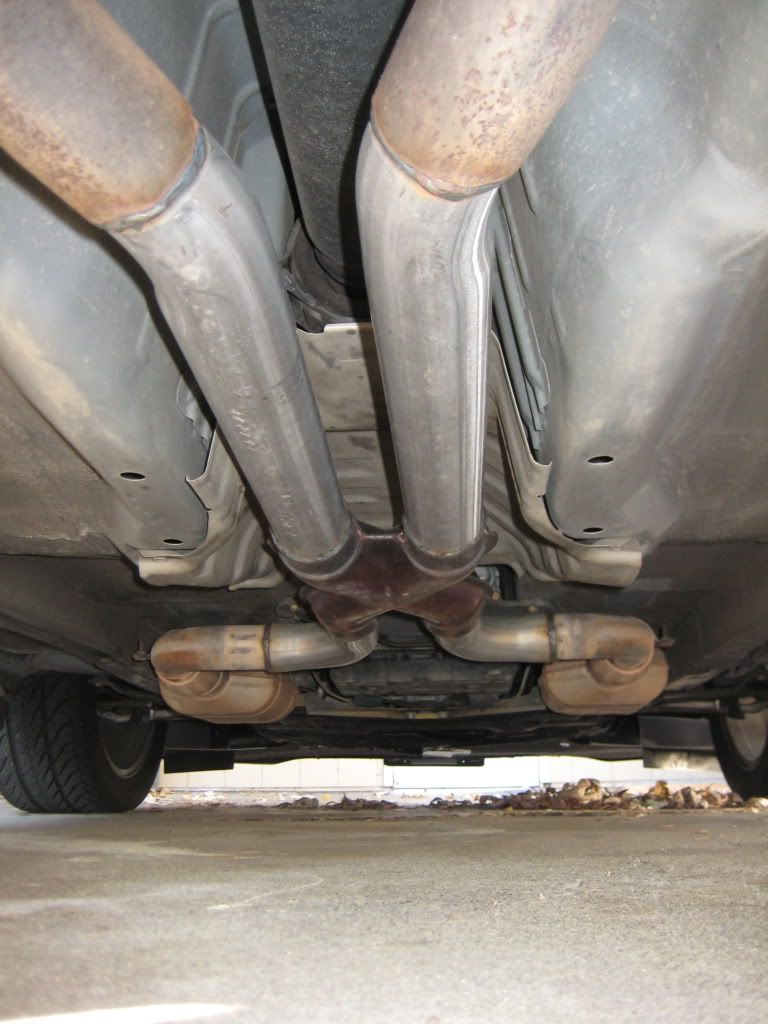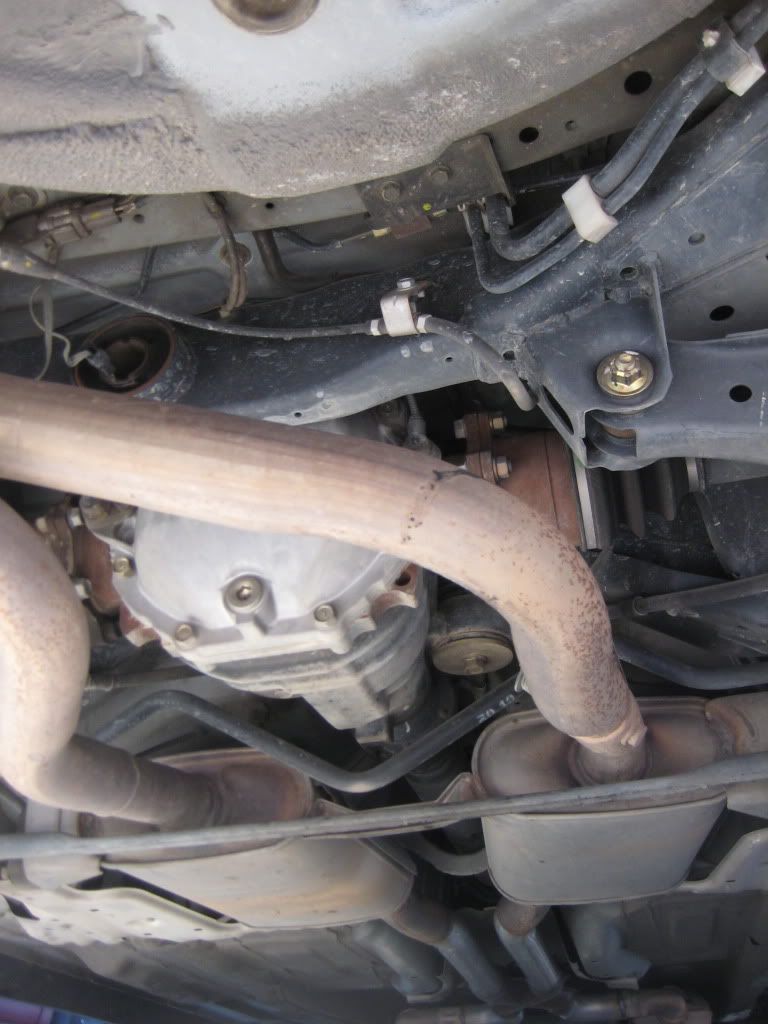 02-25-2012, 02:37 PM
02-25-2012, 02:37 PM
|
#1 (permalink)
|
|
Cyborg ECU
Join Date: Mar 2011
Location: Coastal Southern California
Posts: 6,299
Thanks: 2,373
Thanked 2,172 Times in 1,469 Posts
|
the muffler and exhaust mod thread
Anyone who reads this site regularly knows that periodically someone posts a question about what effect swapping their stock muffler for an aftermarket one will have on their fuel economy. Others ask about exhaust pipes or headers.
Some ask whether removing the muffler entirely will help fuel economy or power. Sometimes people post items for sale online that make unlikely-sounding FE claims. Some ask broadly what effects a mod might have.
The consensus answer tends to be that aftermarket muffler claims for fuel economy are usually bogus, exaggerated, or unproven. Changing the muffler size or the pipe size will have little benefit for fuel economy unless coupled with a general exhaust tune (including calculated pipe sizes) to maximize benefits. There are exceptions. One exception, noted in comment #4 below, is the effect of exhaust mods on a turbo diesel engine (corroborated here and here). Another exception is that shields and wraps of the exhaust header are effective in reducing engine bay temperatures and some have argued improved high-rpm power and/or fuel economy may result if the velocity of exhaust gasses increases as a result of preserved heat (though the FE claim is unproven, see here and here).
A well-known chart on pipe sizes often is suggested as an aid to judging the proper pipe diameter. A caution about this chart is that it always refers to the MAX horsepower a car might produce. MAX hp is reached at very high RPMs (such as 6000rpms). Unless you are modding for racing, you are not likely to be at the max hp for more than perhaps 1% of the car's life. The calculator will not help much in planning for FE gains or everyday driving.
I hope to use this thread to consolidate the best information into one place, through links such as those above and any comments you offer below. Please stay on topic: mufflers, exhaust pipes, exhaust headers, pipe diameter, and how to use them to benefit fuel economy or emissions or (preferably) both. I'll periodically edit this post to include links to other threads or products suggested below.
My own muffler is on its last legs, rusting out and patched around the tailpipe. In researching the claims through this site, I decided to post this thread.
Thanks for reading this long post.
[EDIT: I have installed a Thrush Turbo muffler because it is lighter and flatter than the stock Bosal and will help me with a rear diffuser or belly-pan install. It will not benefit FE or power. I weighed both: 9lbs for the Thrush and pipes and 18lbs for the OEM Bosal. I think it is quieter than the Bosal, but it required welding so it was not cheaper. The Bosal would have bolted on.]
__________________
See my car's mod & maintenance thread and my electric bicycle's thread for ongoing projects. I will rebuild Black and Green over decades as parts die, until it becomes a different car of roughly the same shape and color. My minimum fuel economy goal is 55 mpg while averaging posted speed limits. I generally top 60 mpg. See also my Honda manual transmission specs thread.


Last edited by California98Civic; 12-09-2012 at 03:02 PM..
|
|
|

|
|
The Following 6 Users Say Thank You to California98Civic For This Useful Post:
|
|
 Today Today
|
|
|
|
 Other popular topics in this forum...
Other popular topics in this forum...
|
|
|
|
 02-25-2012, 06:40 PM
02-25-2012, 06:40 PM
|
#2 (permalink)
|
|
(:
Join Date: Jan 2008
Location: up north
Posts: 12,762
Thanks: 1,585
Thanked 3,555 Times in 2,218 Posts
|
And anyone who has read these threads knows I will come on and remind that an extra .000001 mpg (IF a muffler delete gives that) is not worth ruining the quality of life of everyone in the neighborhood for.
That said, especially if you have instrumentation, go ahead and do a proper a-b-a muffler-straight pipe-muffler or good muffler-fart can-good muffler test.
I had one Tempo with a very nice mandrel bent stock system and one where the muffler rusted off. I put a straight "test pipe" on there for a while and noticed no discernable difference in fe.
|
|
|

|
|
The Following 2 Users Say Thank You to Frank Lee For This Useful Post:
|
|
 02-25-2012, 07:33 PM
02-25-2012, 07:33 PM
|
#3 (permalink)
|
|
Master EcoModder
Join Date: Oct 2009
Location: Texas
Posts: 3,523
Thanks: 2,203
Thanked 663 Times in 478 Posts
|
One of the basic myths is "it will flow better with XXXXXX (insert larger pipe 70% of the time).
Since we are ecomodding, we are trying to use the engine in the lower rpms. There is NEVER a time when a larger than factory size will be beneficial.
Thanks for providing the exhaust pipe size chart!
On my particular car, (02 infiniti Q45) there was a very large muffler in the rear. commonly refered to as 'the suitcase muffler'. It wieght about 40lbs. There were already 4 cats, 1 resonator and 2 mufflers beofre this last one. I removed it PRIMARIALY for some weight savings.
I could see where someone (with an older car or a top of the line car) could reduce some weight and still have a relatively quite exhaust. as long as they keep the piping at factory size.
here are some pics:
I have removed tj=he rear dual muffler and installed minis

I di remove the resonator...there was a crack developing and installed the x pipe.

that lead into the factory mufflers:

The rear is covered now with a rear belly pan
Last edited by mcrews; 07-17-2012 at 12:29 AM..
|
|
|

|
|
The Following User Says Thank You to mcrews For This Useful Post:
|
|
 02-25-2012, 08:25 PM
02-25-2012, 08:25 PM
|
#4 (permalink)
|
|
Corporate imperialist
Join Date: Jul 2011
Location: NewMexico (USA)
Posts: 11,266
Thanks: 273
Thanked 3,569 Times in 2,833 Posts
|
About the only application where adding larger pipe and muffler or removing the muffler is going to help will be a turbo diesel.
Turbos like as little back pressure as possible and diesel engines love having their cylinders stuffed with air mass even at light load.
__________________
1984 chevy suburban, custom made 6.5L diesel turbocharged with a Garrett T76 and Holset HE351VE, 22:1 compression 13psi of intercooled boost.
1989 firebird mostly stock. Aside from the 6-speed manual trans, corvette gen 5 front brakes, 1LE drive shaft, 4th Gen disc brake fbody rear end.
2011 leaf SL, white, portable 240v CHAdeMO, trailer hitch, new batt as of 2014.
|
|
|

|
|
The Following 3 Users Say Thank You to oil pan 4 For This Useful Post:
|
|
 02-25-2012, 08:36 PM
02-25-2012, 08:36 PM
|
#5 (permalink)
|
|
Master EcoModder
Join Date: May 2011
Location: Indiana
Posts: 1,194
Thanks: 112
Thanked 511 Times in 213 Posts
|
Quote:
Originally Posted by oil pan 4

About the only application where adding larger pipe and muffler or removing the muffler is going to help will be a turbo diesel.
Turbos like as little back pressure as possible and diesel engines love having their cylinders stuffed with air mass even at light load.
|
Excellent point. Exhaust effects on turbodiesels can be quite different than on naturally aspirated gasoline engines.
__________________
Diesel Dave
My version of energy storage is called "momentum".
My version of regenerative braking is called "bump starting".
1 Year Avg (Every Mile Traveled) = 47.8 mpg
BEST TANK: 2,009.6 mi on 35 gal (57.42 mpg): http://ecomodder.com/forum/showthrea...5-a-26259.html

|
|
|

|
 02-25-2012, 09:40 PM
02-25-2012, 09:40 PM
|
#6 (permalink)
|
|
Master EcoModder
Join Date: Oct 2009
Location: Texas
Posts: 3,523
Thanks: 2,203
Thanked 663 Times in 478 Posts
|
thanks for the clarification on the diesel!
|
|
|

|
 02-26-2012, 04:29 AM
02-26-2012, 04:29 AM
|
#7 (permalink)
|
|
Master EcoModder
Join Date: Oct 2011
Location: Los Angeles
Posts: 588
Thanks: 59
Thanked 59 Times in 47 Posts
|
Quote:
Originally Posted by oil pan 4

About the only application where adding larger pipe and muffler or removing the muffler is going to help will be a turbo diesel.
Turbos like as little back pressure as possible and diesel engines love having their cylinders stuffed with air mass even at light load.
|
Elimination of back pressure has benefits in gas turbocharged engines as well, but top-end power is where this is primarily seen. In regards to fuel economy, I don't know of any proven effects either way.
I might, eventually, modify my exhaust, and if I do, I'll be sure to track any changes in FE.
__________________

|
|
|

|
|
The Following User Says Thank You to Ladogaboy For This Useful Post:
|
|
 02-26-2012, 12:53 PM
02-26-2012, 12:53 PM
|
#9 (permalink)
|
|
Master EcoModder
Join Date: Oct 2011
Location: Los Angeles
Posts: 588
Thanks: 59
Thanked 59 Times in 47 Posts
|
I want to add something to Post #8. What oil pan 4 was saying in regards to diesel turbos "loving their cylinders stuffed with air" would apply to at least some gas turbos. I was doing some more research on my car's tuning, and its AFR range is from 9-11:1 from factory. By eliminating back pressure in the exhaust, the AFR does improve. I'm not sure how much fuel efficiency can by gained by increasing from, say, a 10:1 AFR to a 12:1 AFR, but that seems to be a pretty common shift.
__________________

|
|
|

|
|
The Following User Says Thank You to Ladogaboy For This Useful Post:
|
|
 02-26-2012, 06:17 PM
02-26-2012, 06:17 PM
|
#10 (permalink)
|
|
Cyborg ECU
Join Date: Mar 2011
Location: Coastal Southern California
Posts: 6,299
Thanks: 2,373
Thanked 2,172 Times in 1,469 Posts
|
Quote:
Originally Posted by Ladogaboy

I want to add something to Post #8. What oil pan 4 was saying in regards to diesel turbos "loving their cylinders stuffed with air" would apply to at least some gas turbos. I was doing some more research on my car's tuning, and its AFR range is from 9-11:1 from factory. By eliminating back pressure in the exhaust, the AFR does improve. I'm not sure how much fuel efficiency can by gained by increasing from, say, a 10:1 AFR to a 12:1 AFR, but that seems to be a pretty common shift.
|
I added this point, and all of these:
Quote:
Originally Posted by oil pan 4

About the only application where adding larger pipe and muffler or removing the muffler is going to help will be a turbo diesel.
Turbos like as little back pressure as possible and diesel engines love having their cylinders stuffed with air mass even at light load.
|
Quote:
Originally Posted by Ladogaboy

Elimination of back pressure has benefits in gas turbocharged engines as well, but top-end power is where this is primarily seen. In regards to fuel economy, I don't know of any proven effects either way.
|
Quote:
Originally Posted by viio

|
__________________
See my car's mod & maintenance thread and my electric bicycle's thread for ongoing projects. I will rebuild Black and Green over decades as parts die, until it becomes a different car of roughly the same shape and color. My minimum fuel economy goal is 55 mpg while averaging posted speed limits. I generally top 60 mpg. See also my Honda manual transmission specs thread.


|
|
|

|
|